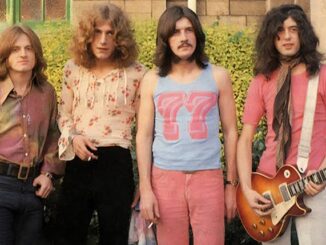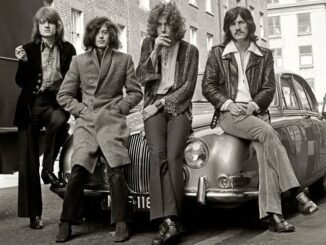
David Coverdale vs. Robert Plant: A Battle of Rock Legends
When it comes to legendary frontmen in the world of rock ‘n’ roll, few names command the respect and reverence of David Coverdale and Robert Plant. These two vocal powerhouses, each with their own unmistakable style and legacy, have defined generations of music lovers with their soaring vocals, magnetic stage presence, and contributions to the world of hard rock and blues-inspired metal. While comparisons are inevitable — especially considering the overlap in their musical styles and even shared collaborations — Coverdale and Plant are unique icons in their own right.
But in the eternal rock fan debate, the question remains: Who truly stands above the rest?
The Origins: From Deep Purple to Led Zeppelin
Robert Plant, born in West Bromwich, England, is best known as the golden god of Led Zeppelin, a band that needs no introduction. From 1968 to 1980, Zeppelin changed the landscape of music. Plant’s howling, blues-drenched voice on tracks like “Whole Lotta Love,” “Black Dog,” and the immortal “Stairway to Heaven” became the gold standard for hard rock and heavy metal vocalists.
Plant wasn’t just a singer — he was a spiritual force. His stage presence was a blend of Dionysian charisma and mysticism, weaving mythology, sexuality, and raw energy into the fabric of rock music. He helped forge the template for the modern frontman: wild, untamed, and larger-than-life.
David Coverdale, hailing from Saltburn-by-the-Sea in North Yorkshire, entered the scene when he joined Deep Purple in 1973, taking over vocal duties from Ian Gillan. Coverdale brought a deeper, bluesier voice to the band’s sound, contributing to the classic albums “Burn” and “Stormbringer.” But it was after Deep Purple’s dissolution that Coverdale truly came into his own, forming Whitesnake in 1978.
Whitesnake would go on to dominate the glam metal and hard rock scenes of the 1980s, with anthems like “Here I Go Again,” “Is This Love,” and “Still of the Night.” Coverdale’s powerful voice and romantic swagger gave the band an identity that stood out amidst a sea of imitators.
The Voice: Range, Power, and Soul
One of the biggest comparisons between these two legends lies in their vocal capabilities.
Robert Plant’s voice is raw, urgent, and emotive. At his peak, he possessed an incredible high tenor range that could scream, croon, and whisper with equal conviction. His vocal delivery was heavily influenced by blues greats like Howlin’ Wolf and Muddy Waters, but he infused that foundation with a unique British elegance. Songs like “Since I’ve Been Loving You” showcase his ability to balance vulnerability and power in a way few singers can replicate.
Over the years, Plant’s voice has aged gracefully, transforming into a richer, more restrained instrument. In his later career, he has leaned into folk, Americana, and world music, exploring textures and moods that go beyond the bombast of his Zeppelin days.
David Coverdale, on the other hand, boasts one of the most powerful and dynamic baritone-tenor voices in rock history. His tone is thicker and silkier than Plant’s, with a bluesy grit that can shift into operatic howls. On tracks like “Still of the Night,” you hear Coverdale channeling the Zeppelin spirit, yet doing so with a velvety sensuality that’s all his own.
While Plant’s voice became more ethereal over time, Coverdale has stayed largely committed to his blues-rock roots, continuing to belt out Whitesnake classics with astonishing control and presence.
Stage Presence and Image
Robert Plant defined the archetype of the shirtless, golden-haired rock god. His stage movements, mic stand theatrics, and wild curls became the visual shorthand for an era. There was an almost spiritual aspect to Plant’s performances — he didn’t just sing; he conjured.
David Coverdale, meanwhile, embraced a different kind of charisma. He projected a suave, seductive persona — the ultimate rock ‘n’ roll gentleman with a devilish grin. In the MTV era, Coverdale’s image was tailor-made for glam metal stardom: flowing hair, open shirts, and an aura of confidence that never veered into arrogance.
While Plant’s performances often felt ethereal and trance-like, Coverdale’s were bold, grounded, and drenched in classic blues-rock showmanship. Both commanded attention in their own way.
Songwriting and Legacy
Led Zeppelin’s catalog, with Plant and guitarist Jimmy Page at the creative helm, revolutionized rock music. From the heavy metal riffs of “Immigrant Song” to the acoustic beauty of “Going to California,” the band’s sonic range was vast, and Plant’s lyrics often explored mythology, love, and the mystic unknown. Zeppelin’s influence can be heard in nearly every rock band that followed.
Whitesnake, under Coverdale’s leadership, created a more accessible and romantic form of hard rock. Songs like “Here I Go Again” became anthems not just for rock fans but for mainstream audiences. While not as experimental as Zeppelin, Whitesnake mastered the art of the power ballad and the bluesy riff, becoming a defining band of the ’80s rock explosion.
One key crossover moment came in the early ‘90s with the Coverdale–Page collaboration — a project that saw Coverdale team up with Jimmy Page for a self-titled album. The result was a blend of Zeppelin riffs and Coverdale’s soulful vocals — a moment many fans dreamed of but also a move that ruffled feathers, especially with Plant himself. While the project was commercially successful, Plant openly criticized it, which only added fuel to the ongoing comparisons.
Modern Relevance
Robert Plant has continued to evolve artistically, showing little interest in rehashing the past. His solo work, especially with Alison Krauss, has received critical acclaim and Grammy recognition. Plant’s refusal to reunite Zeppelin in any significant way (beyond the 2007 one-off O2 Arena show) speaks to his commitment to forward motion, not nostalgia.
David Coverdale, in contrast, has embraced Whitesnake’s legacy with pride. He’s re-recorded classic albums, continued touring, and even hinted at retirement while still performing with unmatched passion. For fans who want that classic rock experience, Coverdale remains one of the few frontmen from his era still delivering it authentically.
The Verdict: A Matter of Taste and Legacy
Choosing between David Coverdale and Robert Plant is less about who is better and more about what kind of rock fan you are.
If you crave mysticism, innovation, and a raw, untamed spirit, Robert Plant is your icon. His work with Led Zeppelin changed music forever, and his artistic evolution keeps him relevant and respected across generations.
If you want bluesy power, romantic fire, and show-stopping vocals rooted in classic rock tradition, David Coverdale is your man. His work with Deep Purple and Whitesnake solidified him as a master of the genre, and his voice remains one of the strongest in rock history.
In truth, both legends have contributed immensely to music in their own unique ways. Rather than choosing sides, perhaps it’s best to appreciate how lucky we are to have both — two icons, two voices, one unshakable legacy.


Be the first to comment